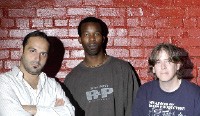Back in January 2005, when they released their debut album, Concrete Swamp, Tunnel Clones were determined to reinvent the local hip-hop scene, which has been long overshadowed by the gangsta-rap phenomenon.
Two-and-a-half years later, MCs Jimmy “Bosco” Catchings and Deverick “Rachi” Sheftall and DJ Luke “Redeye Jedi” Sexton are an older and wiser crew, yet, with the release of World Wide Open, which drops this weekend, they sound as invigorated as ever.
Or, as Bosco sagely declares on the propulsive title track: “I heard memories kill the past and the future kills the present/Never questioning my past, second-guessing my direction/Lyrical blessing/Pay attention you might miss the message.”
“Once people accepted the first album, we gained a lot of confidence,” he notes. “On Concrete Swamp, there were only a few songs where we sat together and [collaborated]. On this one, we had a formula.”
“We had the title before the album was done, which was like, all right, we know what these songs are, and we got to work on them for the last three years,” Jedi says of the decision to woodshed for an extended period between albums.
“As far as ‘community’ goes, it’s been the same from album to album,” he adds. “Sure, it’s grown a little bit, but the same people are still coming to the shows, and the same groups are out there recording. We’re pressing up 1,000 copies of the new album for the local market. We’ve got it on iTunes and CD Baby. And we’re trying to find a publicist. Beyond that, we’ll see what happens.”
That cautious, down-to-earth attitude is simply business as usual for the DJ, who has toiled for years in the underground scene, teaching scratching skills and programming music at venues like the Stax Museum of American Soul Music when not running Memphix labels or working his day job at Whatever on Highland.
Stylistically, Tunnel Clones bring to mind the death-defying verbal acrobatics of late-’80s New York group De La Soul, a comparison the group welcomes. On the 16-track World Wide Open, violin loops, horn blasts, flute riffs, and 
Tunnel Clones: ‘Bosco’ Catchings, ‘Rachi’ Sheftall, and ‘Redeye Jedi’ Sexton
Southern-soul breaks drive the beat, which switches gears like the turntable at an old-school house party, with comedy relief via Moms Mabley samples popping up in the mix, along with multi-instrumentalist Hope Clayburn, guest MCs Fathom 9, Mighty Quinn, and Jason Da Hater, and veteran soul singer Phyllis Duncan.
Lyrically, Tunnel Clones’ MCs rap about what they know: “I’m like Otis Redding — I’ll sing you sad songs/But it’s not about love, it’s how to remain strong/In a world that will break you down, to remold your calm/I’ll make you think twice about the pistol in your palm/Be proud of your upbringing and where you come from,” Bosco stresses on “Breathe Easy,” a history lesson about the Stax Records legacy — and the spirit of Memphis, black and white, rich and poor — that features the sultry Duncan on an unforgettable hook.
On “Last One Standing,” Bosco tackles the daily frustrations of life in Memphis, rapping the verses “Duplex houses, plastic on the windows/9:30 in the morning, stressing burning chronic/Got my resume sent it out to make daily cash flow/You know, the mean green paper that will flip-flop your household,” while on “In the City,” Rachi raps, “Doin’ this shit for years now/Time to rise and shine/See what’s going on.”
“We all have day jobs,” Bosco explains during a Monday night rehearsal at Jedi’s backyard studio, Hemphix Audio Labs.
“We’re gonna do this, regardless,” he continues, gesturing around the recording space, where Tunnel Clones put the finishing touches on World Wide Open. “Some groups think they’re hot shit and that they’re gonna build a lifestyle out of this. We’re more reality-based. We’ve recorded with so many legendary artists who are broke that we know you have to have that day job or some kind of hustle on the side.”
Those rehearsal sessions are yet another indication of the work ethic that drives Bosco, Rachi, and Jedi on a daily basis.
“The recording aspect is just 20 or 30 percent of it for us,” Rachi says. “It’s more about jumping out on stage. It’s important for us to get down the basics — where Bosco comes in, where I come in — which makes being onstage that much freer.
“If we want to take a vamp,” he adds, “we’re skilled enough. I’ll do a beatbox, Redeye will schedule an interlude, and we’ll always be tight. Everyone in the group has that level of perfection. We can josh around all we want to, but during that last rehearsal before the next show, we’re gonna work hard.”